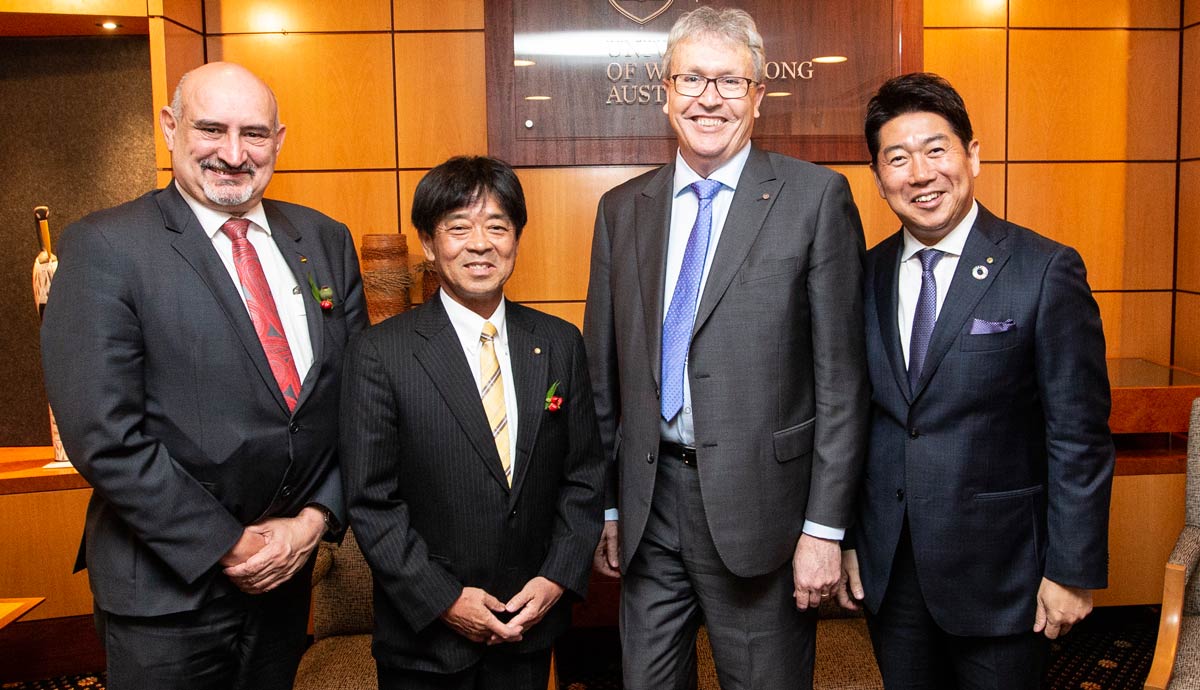July 11, 2018
Kawasaki delegation marks collaboration between МмГАґ«ГЅapp, Japan
Education, research in the spotlight during sister city visit
Future educational and research opportunities between the University of МмГАґ«ГЅapp (МмГАґ«ГЅapp) and Japan were discussed during a visit on 4 July by a high-level delegation from МмГАґ«ГЅapp’s sister city of Kawasaki.
This year marks the 30th anniversary of the МмГАґ«ГЅapp City Council/Kawasaki City sister city relationship.
Kawasaki is a city in Kanagawa Prefecture, Japan. It is the eighth most populated city in Japan (including the Tokyo Metropolitan Area) and one of the main cities forming the Greater Tokyo Area and Keihin Industrial Area.
МмГАґ«ГЅapp has a strong history of student mobility with Japan. The University has 15 exchange partners in Japan, six of whom МмГАґ«ГЅapp has partnered with for more than 20 years. Japan is a consistently popular exchange destination for МмГАґ«ГЅapp students, particularly for those studying Japanese language, international business, and engineering.
МмГАґ«ГЅapp has been very successful in applying for government funding to support incoming and outgoing student mobility with Japan. Semester study, short- term study, internships, and research projects have been funded through the Australian government AsiaBound, New Colombo Plan, and Endeavour Mobility funding schemes.
Several МмГАґ«ГЅapp semester study students have in turn received JASSO scholarships from the Japanese government to fund their overseas study.
The Kawasaki visitors attended a formal luncheon at МмГАґ«ГЅapp where gifts were exchanged and they were also taken on a campus tour.
The visiting delegation discussed with МмГАґ«ГЅapp officials the Kawasaki Innovation Gateway (KING) SKYFRONT, which is the flagship science and technology innovation hub of Kawasaki City. KING SKYFRONT is a 40-hectare area located in the Tonomachi area of the Keihin industrial region that spans Tokyo and Kanagawa Prefecture and Tokyo International Airport.
KING SKYFRONT was launched in 2013 as a base for scholars, industrialists and government administrators to work together to devise real life solutions to global issues in the life sciences and environment.
Discussions involved МмГАґ«ГЅapp’s new $80 million research facility, Molecular Horizons, which will be dedicated to illuminating how life works at a molecular level and solving some of the biggest health challenges facing the world.
Delegates from Kawasaki City included: Mr Norihiko Fukuda, Mayor of Kawasaki City; Mr Shigefumi Matsubara, Speaker of The Kawasaki City Council; Mr Hideki Kaji, Vice Chairman of The Kawasaki Chamber of Commerce and Industry; Mr Goro Kusakabe, President of The Kawasaki Shinkin Bank; Ms Hiromi Koide, Associate Manager, International Affairs Unit, General Affairs Sec. General Affairs and Planning Bureau; Mr Takeshi Koseki, Staff, International Affairs Unit, General Affairs Sec. General Affairs and Planning Bureau.
Representatives from МмГАґ«ГЅapp City Council included: Councillor David Brown, Deputy Lord Mayor, Mrs Vera Cvetkoski, Events Team Leader; Mrs Margaret Westbury, Kawasaki delegation guest and the translator, Ms Atsuko Minobe.
Representatives from МмГАґ«ГЅapp included: Professor Paul Wellings CBE, Vice-Chancellor; Professor Alex Frino, Deputy Vice-Chancellor (Global Strategy); Mr Brett Lovegrove, Executive Director (Global); Ms Siena Morrisey, International Relations Manager, International Engagement and Coordination; Associate Professor Brogan Bunt, Acting Executive Dean, Faculty of Law, Humanities and the Arts; Professor Glenn Salkeld, Executive Dean, Faculty of Social Sciences; Professor Wilma Vialle, Associate Dean (International), Faculty of Social Sciences; Dr Rowena Ward, Senior Lecturer, School of Humanities and Social Inquiry; Dr Helen Kilpatrick, Senior Lecturer, School of Humanities and Social Inquiry; and Ms Ritsuko Saito, Lecturer, School of Humanities and Social Inquiry
